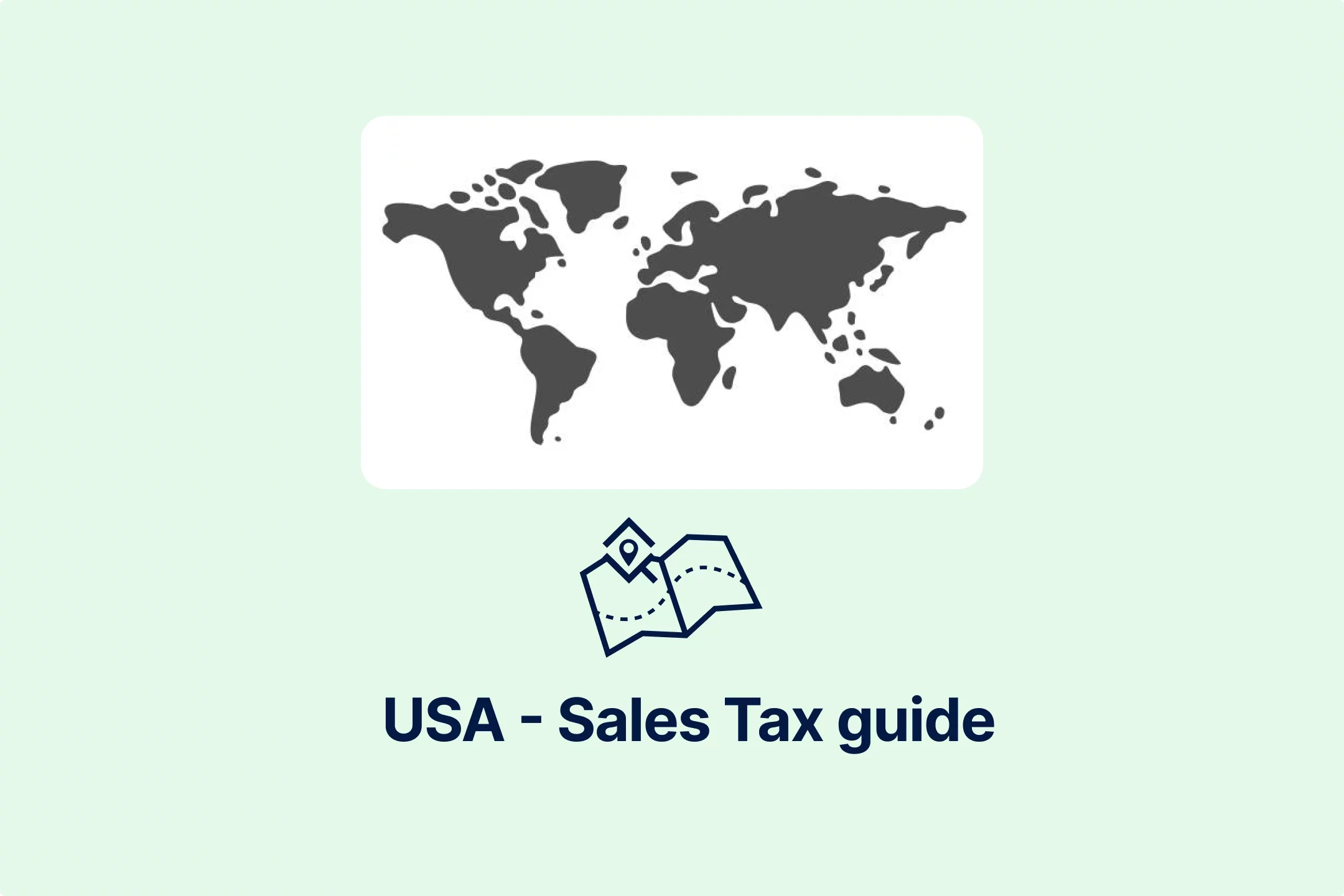Guide de la taxe sur les ventes et l'utilisation en Pennsylvanie : Taux, Nexus et exemptions

Les bases de la taxe sur les ventes et l'utilisation en Pennsylvanie
Taxe de vente
La taxe sur les ventes en Pennsylvanie est imposée sur la vente au détail, la consommation, la location ou l'utilisation de biens meubles corporels ou de biens corporels, y compris les produits numériques, ainsi que certains produits services services. Les services imposables sont généralement liés à la vente de biens matériels. En outre, la taxe sur les ventes est imposée sur le coût de certains services commerciaux.
Taxe d'utilisation
La taxe d'utilisation s'applique généralement aux transactions pour lesquelles aucune taxe de vente n'a été facturée ou perçue. Ces transactions concernent généralement des situations où les consommateurs locaux achètent des biens ou des services à des entreprises ou à des vendeurs sur Internet situés en dehors de l'État, livrés ou utilisés dans l'État.
Taux de la taxe sur les ventes et l'utilisation en Pennsylvanie
La Pennsylvanie impose une taxe sur les ventes et l'utilisation de 6 % à l'échelle de l'État sur les biens et services imposables. Contrairement à de nombreux autres États, qui autorisent et imposent également de multiples taux locaux de taxe sur les ventes et l'utilisation et d'utilisationla Pennsylvanie n'a que deux taxes locales sur les ventes. La première est une taxe de vente de 1 % pour le comté d'Allegheny, et la seconde est une taxe de vente de 2 % pour Philadelphie.
Transactions exonérées d'impôts
En ce qui concerne les transactions exonérées de taxe, la législation de l'État exonère un large éventail d'articles essentiels et d'usage courant. Par exemple, les produits alimentaires de base qui ne sont pas prêts à être consommés, ainsi que les bonbons et les chewing-gums, sont exclus de la taxe.
En outre, les vêtements et le matériel éducatif, tels que les manuels scolaires, sont également exemptés de taxes. En outre, les services liés aux ordinateurs et aux produits pharmaceutiques sont exonérés de la taxe sur les ventes et l'utilisation. Les ventes effectuées à des fins de revente sont également exclues, de même que les combustibles de chauffage résidentiel, y compris le pétrole, l'électricité, le gaz, le charbon et le bois de chauffage. En outre, les services liés au nettoyage des bacs à graisse dans les restaurants, à la réparation ou à l'entretien des vêtements et des chaussures, ainsi qu'au blanchiment ou au nettoyage à sec lorsqu'ils sont effectués par des machines fonctionnant avec des pièces de monnaie sont exonérés de la taxe.
Les exonérations s'étendent aux ventes effectuées au gouvernement américain, au Commonwealth de Pennsylvanie et à ses subdivisions, ainsi qu'à certaines organisations caritatives publiques bénéficiant de numéros d'exonération spécifiques. Des exonérations spécifiques s'appliquent aux activités agricoles, laitières, minières, manufacturières, de transformation, d'impression et d'exploitation forestière, à condition que les achats soient directement et principalement utilisés dans le cadre de ces opérations.
Règles de Nexus en Pennsylvanie
Les personnes imposables, qu'il s'agisse d'entreprises ou de particuliers, doivent s'enregistrer, collecter et verser des impôts en Pennsylvanie si elles établissent un nexus dans l'État, c'est-à-dire si leurs activités commerciales ont un lien significatif avec la Pennsylvanie. Les assujettis peuvent établir un nexus de trois manières principales : en étant physiquement présents dans l'État, ou en appliquant les règles du nexus économique ou du nexus de marché.
Nexus physique
Lorsque des assujettis tiennent des stocks dans l'État et vendent directement à des clients de Pennsylvanie, que ce soit par l'intermédiaire d'un site web, de commandes téléphoniques ou d'autres méthodes, ils sont tenus de s'enregistrer, de collecter et de reverser la taxe sur les ventes de Pennsylvanie. La présence physique est également établie lorsque les assujettis disposent d'un bureau ou d'un lieu d'activité, d'employés, de livraisons, de représentants commerciaux ou louent des biens dans l'État.
Nexus économique
Les règles relatives au nexus économique s'appliquent généralement aux vendeurs en ligne qui ne sont pas physiquement situés à l'intérieur des frontières de l'État. Si ces vendeurs en ligne, communément appelés "out-of-state" ou "remote sellers", réalisent un chiffre d'affaires brut annuel d'au moins 100 000 USD dans l'État, ils sont tenus d'enregistrer, de collecter et de reverser la taxe sur les ventes.
Lien avec le marché
À l'instar du nexus économique, la Pennsylvanie a imposé un ensemble de règles aux facilitateurs de marché qui n'ont pas de présence physique dans l'État. Ces facilitateurs deviennent redevables de la taxe sur les ventes s'ils dépassent 100 000 USD de chiffre d'affaires brut annuel, mesuré sur la base d'une année civile. Contrairement aux vendeurs à distance, les facilitateurs de marché calculent à la fois leurs ventes facilitées et leurs ventes directes pour déterminer s'ils dépassent le seuil.
Produits et services imposables en Pennsylvanie
Les règles générales stipulent que les ventes au détail de la plupart des biens matériels et de certains services énumérés sont soumises à la taxe sur les ventes et l'utilisation. Toutefois, contrairement à d'autres États américains, la liste des services imposables en Pennsylvanie est longue. Elle comprend les services de lobbying fournis par des lobbyistes enregistrés, ainsi que les services d'ajustement, de recouvrement et d'évaluation du crédit lorsque le créancier ou le bénéficiaire est situé en Pennsylvanie. Elle englobe également les services de secrétariat ou d'édition fournis à des clients de Pennsylvanie, à l'exclusion des services de sténographie et de comptes rendus d'audience.
En outre, les agences de placement et les services d'aide sont imposables lorsque le travail est effectué ou utilisé en Pennsylvanie, à l'exception du travail agricole et des services liés à la santé humaine, qui sont exonérés d'impôt. Les services d'entretien et de nettoyage des bâtiments effectués en Pennsylvanie sont taxés, mais les services de réparation sur des biens fixés de manière permanente ne le sont pas.
En outre, les services d'entretien des pelouses, y compris la tonte, la fertilisation et l'application d'herbicides, sont imposables lorsqu'ils sont effectués en Pennsylvanie, tout comme l'entreposage de biens personnels situés dans l'État, sauf dans certains cas précis. En outre, les services de restauration, y compris la nourriture vendue pour être consommée sur place ou à emporter, ainsi que les locations utilisées pour fournir le service, sont imposables.
Cadre du commerce électronique
Comme expliqué précédemment, les vendeurs en ligne qui réalisent des ventes à des consommateurs situés en Pennsylvanie sont redevables de la taxe sur les ventes, même s'ils n'ont pas de présence physique dans l'État, à condition qu'ils dépassent le seuil de nexus économique de 100 000 USD de ventes brutes au cours d'une année civile. Le seuil de nexus économique est basé uniquement sur le volume des ventes, sans exigence de nombre de transactions, et inclut la valeur brute des ventes taxables et non taxables à travers tous les canaux.
Ceci est particulièrement important pour les vendeurs en ligne qui proposent et vendent des biens et des services par le biais de plusieurs canaux, y compris les places de marché en ligne gérées par des facilitateurs de marché. Ces vendeurs sont communément appelés "vendeurs de la place de marché".
Règles applicables aux places de marché
En règle générale, les vendeurs des places de marché qui n'ont pas de présence physique en Pennsylvanie ne calculent que les ventes directes aux consommateurs. Cela signifie que toute vente facilitée par un facilitateur de place de marché est exclue du calcul du seuil. Toutefois, dans les cas où ils vendent leurs biens matériels par l'intermédiaire d'un facilitateur de place de marché, si ce dernier ne s'occupe pas de la collecte ou du versement de la taxe sur les ventes en leur nom, ils restent redevables de la taxe sur les ventes.
Biens et services numériques
La Pennsylvanie est l'un des États américains qui traite explicitement les produits numériques comme des biens matériels. Par conséquent, les produits numériques sont soumis à la taxe sur les ventes et l'utilisation. Les produits numériques sont définis comme tous les produits livrés par voie électronique, qu'ils soient téléchargés, diffusés en continu ou envoyés par courriel, plutôt que sur un support physique, tel qu'une clé USB ou un DVD.
Les vidéos, la musique, les livres, les applications, les jeux et les logiciels en boîte sont tous considérés comme des produits numériques. Les achats numériques taxables comprennent les livres électroniques de plateformes telles que Kindle ou Nook, les abonnements pour télécharger ou accéder à des livres électroniques, les vidéos diffusées en continu ou téléchargées, et les services tels que Netflix ou Hulu, ainsi que la musique, les sonneries, les livres audio et les abonnements à des services de diffusion audio en continu ou par satellite. En outre, les applications, les compléments de jeu, les abonnements à des jeux en ligne, les photographies et les cartes de vœux électroniques sont également soumis à l'impôt.
Il existe toutefois quelques exceptions à ces règles. Ainsi, les achats effectués par des organisations non lucratives et caritatives qualifiées, les manuels scolaires achetés par l'intermédiaire d'écoles accréditées, les abonnements à des journaux et magazines, et les produits numériques achetés pour la revente sont tous exonérés de la taxe sur les ventes et l'utilisation.
Marché numérique
Les places de marché en ligne ou numériques sont tenues de collecter et de verser les taxes pour le compte des vendeurs de la place de marché si elles remplissent les conditions définies pour les facilitateurs de la place de marché. En vertu de la législation de Pennsylvanie, les facilitateurs de marché sont décrits comme des entités qui s'associent à des vendeurs pour inscrire leurs biens et services sur une place de marché ou en faire la publicité. En outre, les facilitateurs s'occupent également de la collecte des paiements auprès des acheteurs, soit directement, soit indirectement, et transmettent ensuite le paiement aux vendeurs.
Opérateur de plateforme numérique
Les opérateurs de plateformes numériques qui remplissent toutes les conditions pour être considérés comme des facilitateurs de places de marché doivent collecter et verser la taxe sur les ventes pour le compte des vendeurs de la place de marché si leurs ventes facilitées ou leurs propres ventes directes aux consommateurs dépassent 100 000 USD en valeur brute au cours d'une année civile.
Exigences en matière de déclaration et de paiement en Pennsylvanie
Les exigences en matière de déclaration et de paiement de l'impôt dépendent de la dette fiscale de l'assujetti. Par conséquent, si la dette fiscale trimestrielle d'un assujetti est comprise entre 25 000 et 100 000 USD, il doit effectuer des paiements anticipés de niveau 1 au titre de l'Accelerated Sales Tax (AST), c'est-à-dire payer 50 % de la taxe de l'année précédente pour le même mois ou 50 % de la dette du mois en cours.
Les assujettis dont la dette fiscale trimestrielle est égale ou supérieure à 100 000 USD relèvent du niveau 2 de l'AST et paient 50 % de la taxe de l'année précédente pour le même mois. Les assujettis dont la dette trimestrielle est inférieure à 25 000 USD mais supérieure à 600 USD doivent déposer une déclaration mensuelle, tandis que ceux dont la dette trimestrielle est inférieure à 600 USD mais dont la dette annuelle est supérieure à 300 USD doivent déposer une déclaration trimestrielle.
La dernière catégorie d'assujettis est constituée de ceux dont les obligations annuelles sont inférieures ou égales à 300 USD, qui doivent déposer une déclaration semestrielle, le 20 août pour la période allant de janvier à juin et le 20 février pour la période allant de juillet à décembre.
Pénalités en cas de non-respect des exigences de la taxe sur les ventes et l'utilisation
Une pénalité de 5 % par mois est appliquée pour chaque mois où la taxe reste impayée, à compter du jour suivant la date d'échéance. Si un assujetti ne remplit pas sa déclaration de taxe sur les paris à la date d'échéance ou à la date d'échéance prolongée dans les 30 jours suivant la réception d'un avis écrit du ministère des Finances de Pennsylvanie, une pénalité supplémentaire de 500 USD lui sera imposée.
En plus des pénalités de retard et de paiement, des intérêts commencent à courir le jour suivant la date d'échéance de la taxe et continuent à courir jusqu'à ce que vous payiez, à un taux fixé par le secrétaire.

Articles en vedette

Burkina Faso FEC Facturation électronique obligatoire à partir de juillet 2026
🕝 February 24, 2026
Réforme de la TVA au Mozambique : biens et services numériques à partir de 2026
🕝 February 17, 2026
Disparition de commerçants et fraude à la TVA : décision de justice en Lituanie
🕝 February 9, 2026
Formation continue en fiscalité et comptabilité : constituer des équipes pour un avenir plus rapide
🕝 January 27, 2026Plus de nouvelles de États-Unis
Obtenez des mises à jour en temps réel et des informations sur l'évolution de la situation dans le monde entier, afin d'être informé et préparé.
-e9lcpxl5nq.webp)




-fd4vrjrcmo.webp)











-qoqtiao7l2.webp)





-o0xyg5unvs.webp)










-sug7vykj81.webp)
















-pofe7ucwz3.webp)









-de8hdb1bn3.webp)








-xbhr0m4jsb.webp)


-ae6fi6cjox.webp)














-b0fpsws1w1.webp)





















-x78wuofpzj.webp)
















-b44f1vjl1i.webp)

-priw8nq5xc.webp)


.png)

.png)






























